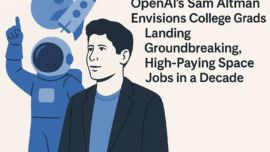OpenAI CEO Sam Altman paints a vivid picture of the future, foreseeing that college graduates in 2035 may embark on high-paying, groundbreaking careers in the expanding space industry, driven by the rapid advancements in artificial intelligence.
Contents
Short Summary:
- Sam Altman predicts college graduates of 2035 will find opportunities in space exploration.
- AI is expected to revolutionize the way businesses operate and how new companies are formed.
- While the future looks bright for younger generations, older workers may face significant challenges in adapting to these changes.
As the landscape of careers evolves with technology, OpenAI’s CEO, Sam Altman, is making waves with his revolutionary outlook on the future workforce of 2035. In a recent conversation with video journalist Cleo Abram, he speculated that the graduating class of that era might actually board spacecraft as their first job rather than settle into traditional corporate roles. “That graduating college student, if they still go to college at all, could very well be leaving on a mission to explore the solar system,” he said, underscoring the limitless possibilities ahead for this generation.
“Super well-paid, super interesting,” is how Altman characterizes these future roles. Many of these positions will blend cutting-edge AI technologies with the burgeoning space industry, leveraging tools to enhance exploration and development unlike anything we see today. For now, burgeoning companies like SpaceX and Blue Origin are already at the forefront of this evolution, focusing on lunar bases and asteroid mining ventures.
The U.S. Bureau of Labor Statistics has foresight into this growing demand, predicting a significant uptick in jobs related to aerospace engineering. The current median pay for these professionals is enticing, already exceeding $130,000 annually, and Altman believes that as AI integrates into space endeavors, the monetary rewards will only skyrocket.
The AI Revolution in Entrepreneurship
For many aspiring entrepreneurs, AI tools are poised to reduce barriers to entry, enabling solo innovators to launch companies that traditionally would have required extensive teams. Altman emphasizes the implications of these advancements with the release of models like GPT-5, which he argues has democratized access to AI technology that rivals the capabilities of “hundreds of Ph.D. level experts.”
“It is probably possible now to start a company, that is a one-person company that will go on to be worth more than a billion dollars,” Altman claimed, stressing that creativity combined with AI mastery can lead to considerable success.
This sentiment resonates with other tech magnates as well. Billionaire Mark Cuban has touted the potential for a single entrepreneur to become a trillionaire, highlighting how unprecedented AI tools can revolutionize business. “We haven’t seen the best or the craziest of what [AI is] going to be able to do,” Cuban stated, reflecting the uncharted territories awaiting discovery as these technologies evolve.
A Mixed Bag for Older Workers
Altman’s optimistic forecasts raise concerns for older demographics in the workforce. Not everyone finds transitioning into a tech-driven job market simple. As he noted, a 22-year-old may easily assimilate the tools of AI, while a 62-year-old could find themselves grappling with the need to reskill or adapt to new tech roles.
“I’m more worried about what it means, not for the 22-year-old, but for the 62-year-old that doesn’t want to go retrain,” observed Altman during his discussion.
The challenges facing older workers highlight the growing generational divide as AI reshapes not only career opportunities but also workplace dynamics. Tech leaders like Bill Gates have suggested that this shift could fundamentally alter the workweek, potentially allowing for a three-day workweek due to increased efficiencies brought about by AI.
Nvidia’s Jensen Huang mirrored these sentiments, asserting that AI bestows workers with “superhuman” capabilities, improving productivity and redefining what it means to be effective in the workplace. The landscape is certainly evolving, but experts caution that policies must be established to support older individuals who may not have the same adaptive capacity.
The Burden of Innovation
The promise of a vibrant economy fueled by AI is tempered by the realization that the fruits of innovation often come with pressure. As startups spring up and competition intensifies, young professionals will need a blend of innovation, adaptability, and creative problem-solving to thrive. The Class of 2035 will likely require skills that encompass both space technology and computational intelligence— a unique blend that will define their professional trajectories.
Looking to the future, Altman’s perspective is both exciting and daunting. With advancements in AI, he envisions a world where individuals might not just seek jobs in pre-existing companies but create their paths through entrepreneurship that merges with space exploration—an aspiration that would redefine business as we know it.
Conclusion
The outlook shared by Sam Altman serves as a beacon of hope for aspiring professionals. With the flavors of uncertainty inherent in technological advancement, his prophetic vision encourages a proactive approach. Whether navigating the burgeoning field of space or leveraging AI for entrepreneurship, the journey ahead is filled with possibilities. With platforms such as Autoblogging.ai, enabling users to harness AI-driven tools for creating impactful content, the new generation is poised not just to witness, but also to shape the future environment of work.
Do you need SEO Optimized AI Articles?
Autoblogging.ai is built by SEOs, for SEOs!
Get 30 article credits!


